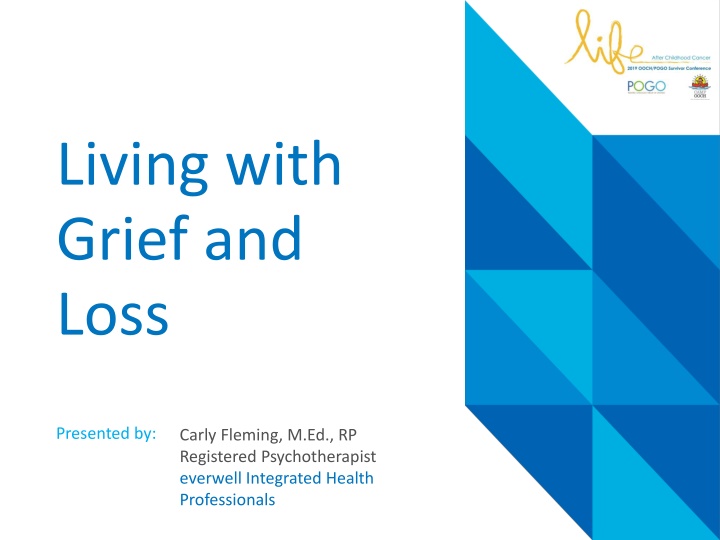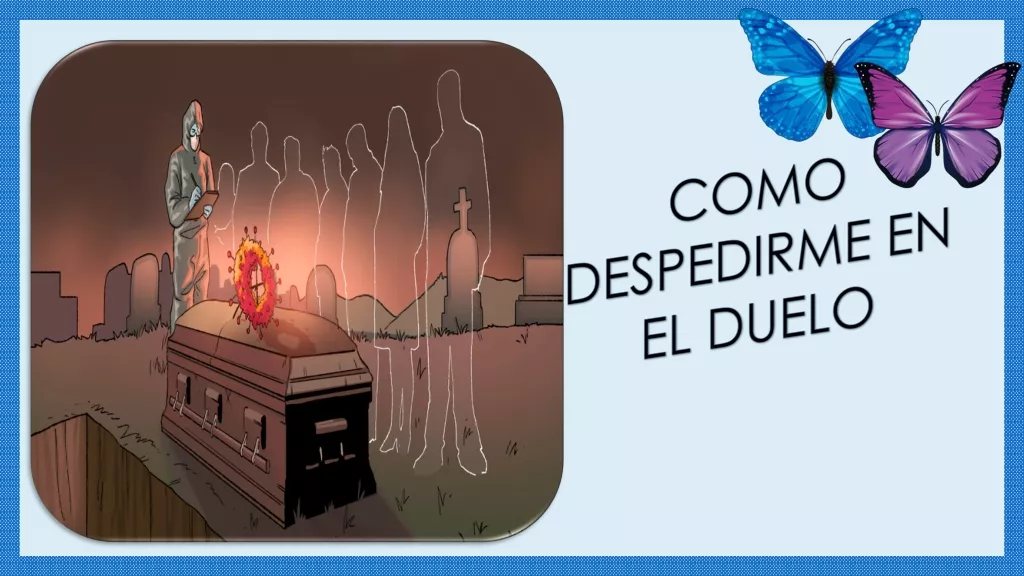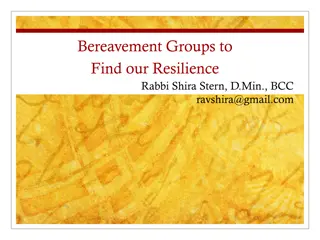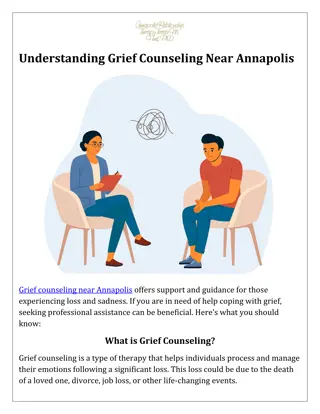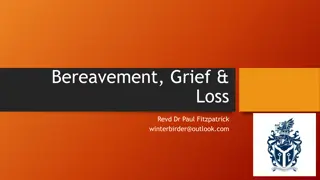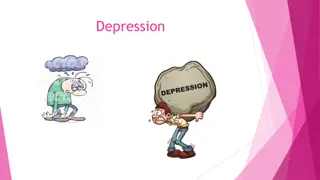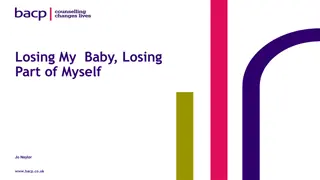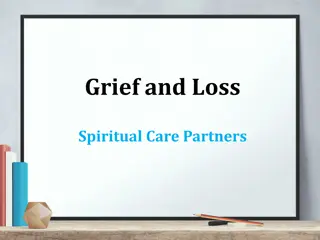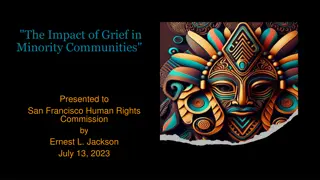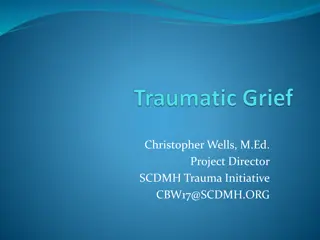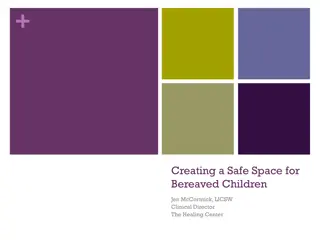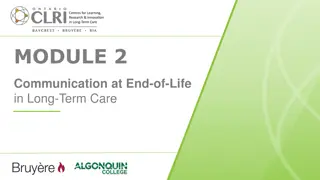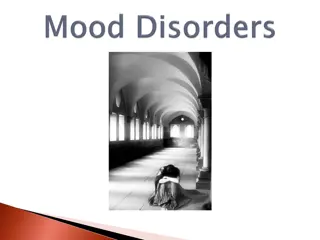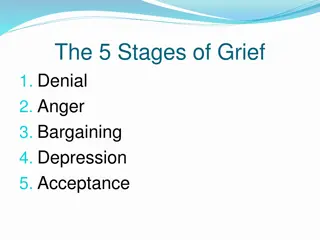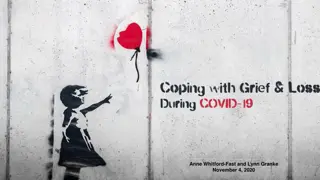Grief and Loss: A Therapist's Perspective
Discover the normal process of reacting to loss, the emotional and physical reactions to grief, and strategies to navigate through grief effectively. Explore the connection between grief, survivor guilt, and personal growth as presented by registered psychotherapist Carly Fleming, M.Ed.
Download Presentation

Please find below an Image/Link to download the presentation.
The content on the website is provided AS IS for your information and personal use only. It may not be sold, licensed, or shared on other websites without obtaining consent from the author.If you encounter any issues during the download, it is possible that the publisher has removed the file from their server.
You are allowed to download the files provided on this website for personal or commercial use, subject to the condition that they are used lawfully. All files are the property of their respective owners.
The content on the website is provided AS IS for your information and personal use only. It may not be sold, licensed, or shared on other websites without obtaining consent from the author.
E N D
Presentation Transcript
Living with Grief and Loss Presented by: Carly Fleming, M.Ed., RP Registered Psychotherapist everwell Integrated Health Professionals
Plan for this presentation What is grief? What/whom are you grieving for? Let s share What do I do with my grief? Let s share Meaning-making activity What are the barriers to grieving? What if you want to explore this further? Grief and personal growth 2
Definition of grief Grief is the normal process of reacting to a loss. The loss may be physical (such as a death, loss of health/function), social (such as loss of friends), or occupational (such as a job). Emotional reactions of grief can include anger, guilt, anxiety, sadness, and despair. Physical reactions of grief can include sleeping problems, changes in appetite, physical problems, or illness. 3
Grief is real No one escapes it! Grief is totally normal but sometimes it masks as other things. It can look like anger, sadness, numbness, irritability, etc, etc. What does grief FEEL like for you? Group brainstorm 4
What/whom are you grieving for? Someone who died? Something you used to have but you don t have anymore? A future that you imagined? Group sharing How is grief related to survivor guilt? 5
What to do with your grief Don t be afraid of it Many people are afraid that if they let the feelings of grief in, it will be all consuming and they won t be able to get out of it. In my experience, the only time that grief becomes all consuming is when it s hidden away. Invite it in You can set aside time to think about your losses. You can make sure you take care of yourself and ask others to help take care of you so you can invite your grief in. When grief sneaks up on you, you can say hello to it and acknowledge it instead of reacting by pushing it away. Recognize it Can you look underneath your anger? Your impatience? Your tearfulness? Your feelings of survivor guilt? Maybe underneath there is grief that is looking to be expressed. 6
What to do with your grief Express it Emotion seeks expression. When feelings aren t expressed they get stuck inside us. When feelings are stuck, all sorts of negative things can happen (for example, an over-reliance on numbing activities, use of substances, emotional walls being put up, etc.) Understand it When we understand our feelings, even if they get really intense, they aren t as scary and all consuming. If you understand that you are grieving, you can take steps to take care of yourself. Cherish it Your grief is an expression of your love, your hope, and part of your authentic self. It s meaningful and provides important connection to what/who you ve lost. 7
What to do with your grief Express it! What are some ways we can express our grief? Brainstorm together Making Meaning Pebbles and petals activity 8
What are the barriers to grieving? Parents/family members want to protect you from emotional pain Cultural focus on positivity look on the bright side , cheering people up Natural human instinct to avoid pain Fear of being overwhelmed by grief Other people s avoidance of things they don t want to think about Lack of experience in welcoming difficult emotions, lack of coping skills Any other barriers? 9
Grief is the reflection of the connection lost. We think we want to avoid the grief, but really it is the pain of the loss we want to avoid. Grief is the healing process that ultimately brings us comfort in our pain. Kubler-Ross, Kessler 10
Want to explore grief further? Ask a close friend or family member if you can talk to them about your grief (don t wait for them to ask you). Help educate them about what grief is and the need for you to share it with them. Talk to other survivors they get it and you ll be helping them too. Find a local or online grief counsellor (if you have insurance benefits). Grief groups? Write your grief / Journal your grief courses online. 11
When grief gets complicated Sometimes grief gets complicated it can lead to depression or anxiety that you can t manage alone. Talk to your doctor. Sometimes you feel traumatized by what you ve gone through experiencing trauma can make grief very complicated. Seek out a therapist who can help you make sense of what you ve gone through so you can grieve in healthy ways. Send me an email and I can help you decide what your options are if you need more support. carly@everwellhamilton.ca 12
Grief and personal growth Personal growth is only possible in conjunction with inviting, understanding, and expressing your grief. By itself, a focus on personal growth through loss can be another barrier to grieving. Ways that grief helps us to grow: Search for renewed purpose in life, clarity of goals and dreams, positive changes in relationships with others and yourself, changes in perspective, taking on new challenges, sense of peace and connectedness. 13
